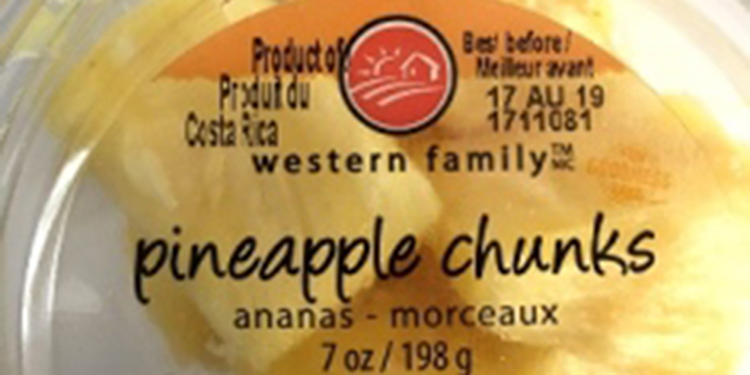Latest News
BC Centre for Disease Control finds Hep A in more products
Published 2:36 PDT, Thu September 7, 2017
The warning from our provincial health
watchdog has been widened. While, to date, no cases of Hepatitis A, a highly contagious liver virus,
have been found from this source, the BC Centre for Disease Control (BC-CDC)
cautions people not to eat any of the products listed below:
Fresh pineapple chunks 227g and 425g
Fresh peeled cored pineapple 16oz
Fresh fruit salad 198g, 227g and 425g
Fresh citrus salad 226g
According to BC-CDC, “Current information
indicates the cups were produced on Aug. 11 and distributed to 38
Save-On-Foods, Overwaitea Foods and PriceSmart Foods stores in BC. The fruit
cups may have been on sale from Aug. 11 and had a best before date of Aug. 19.”
If you or someone you know may have eaten any
of these products, a free Hepatitis A vaccine is available through the stores’
pharmacies, the public health units, and some pharmacies. The vaccine can
prevent or reduce symptoms if received within 14 days of exposure to Hepatitis
A.
If in doubt, ask your doctor, pharmacist or
call the free provincial HealthLink BC at 811 to speak with a health care
professional. For 811 service, the
BC government says translation services are available in more than 130
languages. Dialing 711 offers the same service to those with hearing
impairments. Or, for online information, go to: vch.ca/about-us/news/Hep-A
As part of their community service, free
hepatitis A vaccines are offered at any Overwaitea banner stores including
Save-On-Foods, PriceSmart Foods, Overwaitea Foods and Urban Fare. Anyone with
concerns can contact the pharmacist at any of these stores.
The disease control agency is clear that they
have found the virus in products sold and have yet to find a person ill from
eating them. But, to complicate things, with Hepatitis A it can be up to 50
days from the time you are infected until you get sick and 90 percent of
infected children have no symptoms of the disease but as soon as a person is
infected, even if not feeling sick, they can give Hepatitis A to others. So, it
may be too soon to tell if anyone has caught Hepatitis A from the contaminated
products.
Hepatitis A infections are declining in BC.
Because, the agency says, “The decline is related to the general improvement in
hand hygiene and an effective hepatitis A vaccine.” In fact, these infections
are not declining everywhere in the world. You can catch this virus from
contaminated fresh food, water, ice or a host of other sources while on
vacation. Before you travel, check to see if the vaccine is recommended.
Genetic tests show which strain of Hepatitis
A people have. This genetic testing of the virus allowed the centre to say with
certainty, “In 2012, a cluster [of Hepatitis A infections] was associated with
consumption of a frozen berry blend.”
Hepatitis A, also called Hep A, is extremely
contagious. It takes getting very little virus into your mouth to catch it.
Unlike many other pathogens, this virus spreads readily from person to person.
Most people don’t wash their hands long
enough or well enough. Did you know you should be rubbing them with soap for 20
seconds, the time it takes to sing Row, Row, Row Your Boat through twice? If
you have any questions, check out this page:
mayoclinic.org/healthy-lifestyle/adult-health/in-depth/hand-washing/art-20046253
Even if you wash your hands well and with
soap, particularly after using the bathroom or before preparing food, if you
have been exposed to Hep A or even think you have, you must avoid preparing
food, at home or at work, until you know you didn’t catch the virus. In fact,
infected food prep or food service workers have been the source of past
outbreaks.
According to BCCDC, “Hepatitis A is an
infection caused by a virus that affects the liver. The virus is found in the
stool of an infected person. It is spread when a person eats food or drinks
water that has come in contact with infected stool. Infected food handlers can pass the virus on to other people
if they do not wash their hands with soap and water after using the bathroom.”
Further, BCCDC says, “Hepatitis A symptoms
include yellow skin or eyes, loss of appetite, fever, tiredness, stomach ache,
nausea, dark-coloured urine, and light or whitish-coloured bowel movements.”
BCCDC cautions, “Symptoms can also be so mild
that a person may not be aware that they have the disease. Illness can last for
several weeks but people generally recover completely. Illness may be life threatening in the
elderly or those with other chronic liver disease. Symptoms may develop 15-50
days after exposure.”
Again, BCCDC warns, “If you consumed this
product on Aug. 18 or later, you should receive a dose of hepatitis A vaccine.
If you develop symptoms of hepatitis A, contact your family doctor and local
health unit office immediately. Consumers who have frozen the product should
discard it.”
According to BCCDC, “The investigation is
ongoing. Other products are believed to be affected and more information will
be provided as it becomes available.”
Information is also available under Product
Alerts on the Save-On-Foods website: https://www.saveonfoods.com/product-alerts/




























